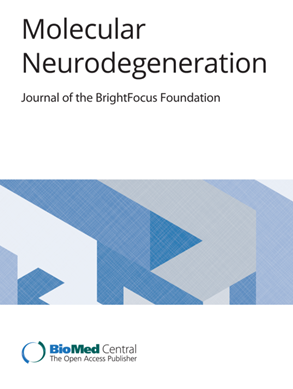APOE genotype influences on the brain metabolome of aging mice – role for mitochondrial energetics in mechanisms of resilience in APOE2 genotype
IF 17.5
1区 医学
Q1 NEUROSCIENCES
引用次数: 0
Abstract
Alzheimer’s disease (AD) risk and progression are significantly influenced by APOE genotype with APOE4 increasing and APOE2 decreasing susceptibility compared to APOE3. While the effect of those genotypes was extensively studied on blood metabolome, less is known about their impact in the brain. Here we investigated the impacts of APOE genotypes and aging on brain metabolic profiles across the lifespan, using human APOE-targeted replacement mice. Biocrates P180 targeted metabolomics platform was used to measure a broad range of metabolites probing various metabolic processes. In all genotypes investigated we report changes in acylcarnitines, biogenic amines, amino acids, phospholipids and sphingomyelins during aging. The decreased ratio of medium to long-chain acylcarnitine suggests a reduced level of fatty acid β-oxidation and thus the possibility of mitochondrial dysfunction as these animals age. Additionally, aging APOE2/2 mice had altered branch-chain amino acids (BCAA) profile and increased their downstream metabolite C5 acylcarnitine, indicating increased branched-chain amino acid utilization in TCA cycle and better energetic profile endowed by this protective genotype. We compared these results with human dorsolateral prefrontal cortex metabolomic data from the Religious Orders Study/Memory and Aging Project, and we found that the carriers of APOE2/3 genotype had lower markers of impaired BCAA katabolism, including tiglyl carnitine, methylmalonate and 3-methylglutaconate. In summary, these results suggest a potential involvement of the APOE2 genotype in BCAA utilization in the TCA cycle and nominate these humanized APOE mouse models for further study of APOE in AD, brain aging, and brain BCAA utilization for energy. We have previously shown lower plasma BCAA to be associated with incident dementia, and their higher levels in brain with AD pathology and cognitive impairment. Those findings together with our current results could potentially explain the AD-protective effect of APOE2 genotype by enabling higher utilization of BCAA for energy during the decline of fatty acid β-oxidation.APOE基因型对衰老小鼠脑代谢组的影响——APOE2基因型线粒体能量学在恢复机制中的作用
APOE基因型显著影响阿尔茨海默病(AD)的风险和进展,与APOE3相比,APOE4的易感性增加,APOE2的易感性降低。虽然这些基因型对血液代谢组的影响被广泛研究,但对它们对大脑的影响知之甚少。在这里,我们研究了APOE基因型和衰老对整个生命周期大脑代谢谱的影响,使用人类APOE靶向替代小鼠。Biocrates P180靶向代谢组学平台用于测量广泛的代谢物,探测各种代谢过程。在研究的所有基因型中,我们报告了衰老过程中酰基肉碱、生物胺、氨基酸、磷脂和鞘磷脂的变化。中链酰基肉碱与长链肉碱比值的降低表明,随着这些动物年龄的增长,脂肪酸β-氧化水平降低,因此可能出现线粒体功能障碍。此外,衰老的APOE2/2小鼠的支链氨基酸(BCAA)谱发生改变,其下游代谢物C5酰基肉碱(acylcarnitine)增加,表明该保护性基因型增加了支链氨基酸在TCA循环中的利用,并赋予了更好的能量谱。我们将这些结果与来自宗教团体研究/记忆与衰老项目的人类背外侧前额叶皮层代谢组学数据进行了比较,我们发现APOE2/3基因型携带者的BCAA代谢受损标记物较低,包括甲酰肉碱、甲基丙二酸和3-甲基谷氨酸。总之,这些结果表明APOE2基因型可能参与TCA循环中BCAA的利用,并为进一步研究APOE在AD、脑老化和脑BCAA能量利用中的作用提供了人源化APOE小鼠模型。我们之前的研究表明,血浆BCAA水平较低与痴呆的发生有关,而大脑中BCAA水平较高与AD病理和认知障碍有关。这些发现和我们目前的结果可能潜在地解释APOE2基因型在脂肪酸β-氧化下降过程中通过提高BCAA的能量利用率来保护ad的作用。
本文章由计算机程序翻译,如有差异,请以英文原文为准。
求助全文
约1分钟内获得全文
求助全文
来源期刊

Molecular Neurodegeneration
医学-神经科学
CiteScore
23.00
自引率
4.60%
发文量
78
审稿时长
6-12 weeks
期刊介绍:
Molecular Neurodegeneration, an open-access, peer-reviewed journal, comprehensively covers neurodegeneration research at the molecular and cellular levels.
Neurodegenerative diseases, such as Alzheimer's, Parkinson's, Huntington's, and prion diseases, fall under its purview. These disorders, often linked to advanced aging and characterized by varying degrees of dementia, pose a significant public health concern with the growing aging population. Recent strides in understanding the molecular and cellular mechanisms of these neurodegenerative disorders offer valuable insights into their pathogenesis.
 求助内容:
求助内容: 应助结果提醒方式:
应助结果提醒方式:


